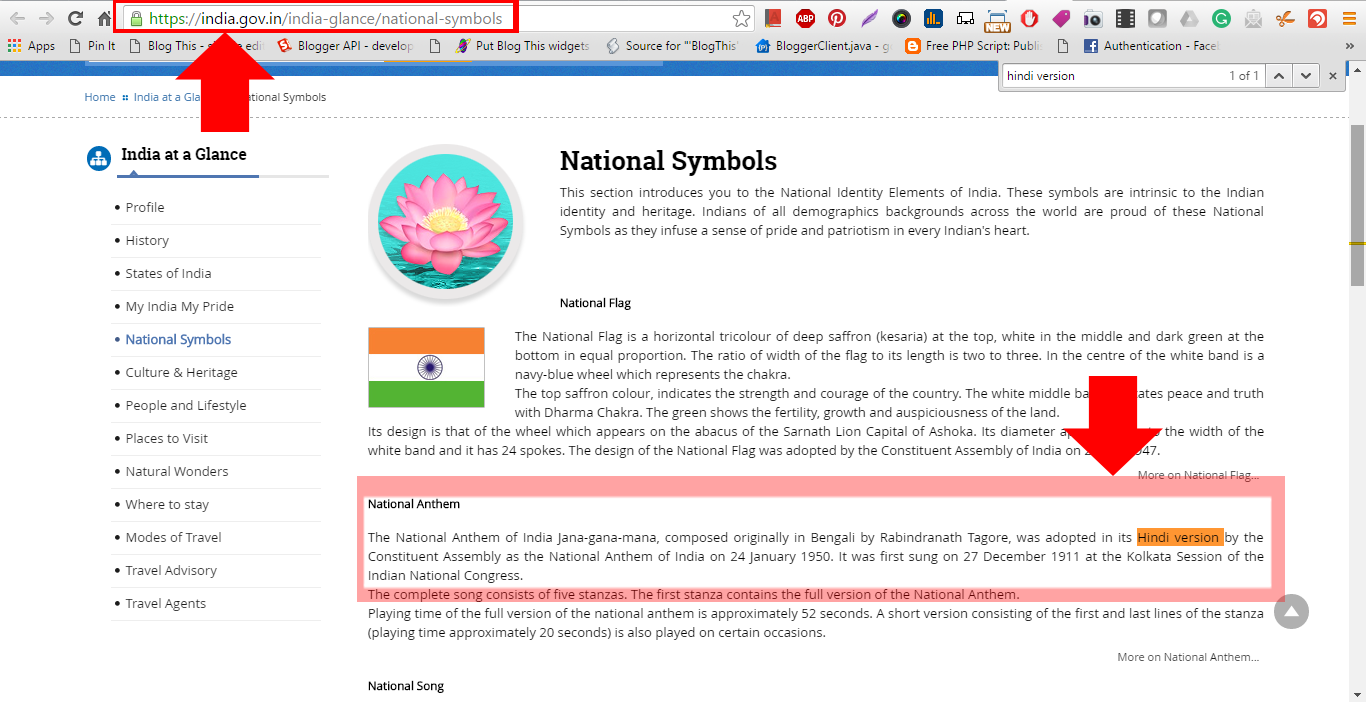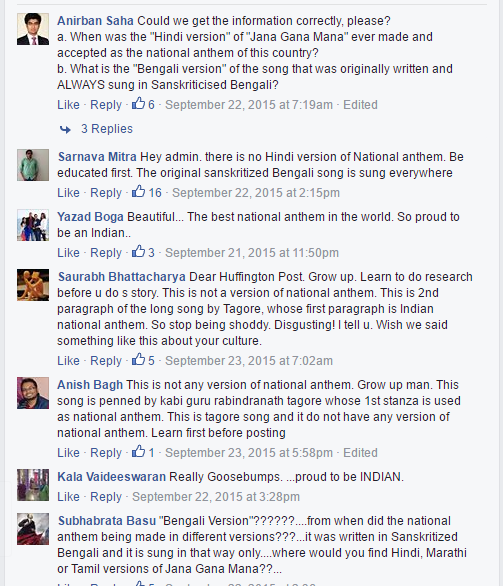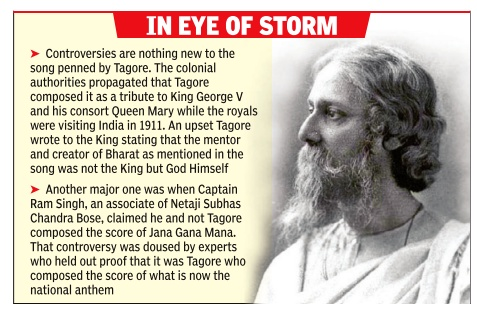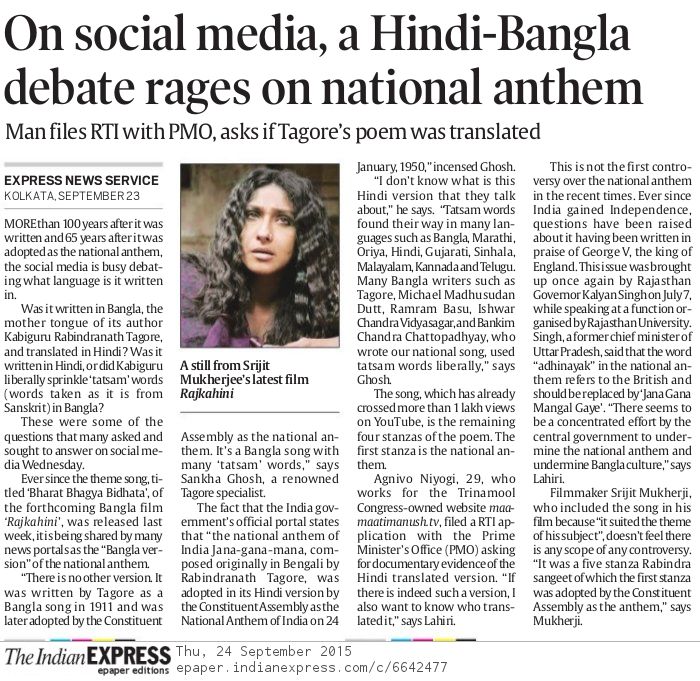What was supposed to be an article to promote a Bengali film “Rajkahini” caught my attention for reasons not related to the film. Barring the first stanza of “Jana Gana Mana”, which is accepted as the Indian national anthem, director Srijit Mukherjee’s film had the latter 4 stanzas composed and sung in the film. Most of the national news agencies mentioned this as the “Bengali version of the national anthem”. Prajakta Hebbar of Huffington Post went on to say that the “Hindi version” of the song was accepted as the national anthem. It is not her fault.
A slight research showed me that INDIA.GOV.IN website mentions “National Anthem” under “National Symbols” (link) and mentions “The National Anthem of India Jana-Gana-Mana, composed originally in Bengali by Rabindranath Tagore, was adopted in its Hindi version by the Constituent Assembly as the National Anthem of India on 24 January 1950.”
Screenshot (16.05.2016 09:27 AM)

That’s such a shame | India.gov.in
After Huffington Post shared it on their Facebook page, there was a furore. People questioned them about their research and the authenticity of the article. While I knew that Prajakta or any other sensible writer, would not write without a proper citation, I thought of filing an RTI after expressing my discontent over the social media (link). Agnivo Niyogi (prominent blogger from Kolkata) too took this up and filed another RTI.

People responding to Huffington Post article | Screenshot 16.05.2016 09:40 AM | Download the full screenshot here: Link
The National Anthem of India Jana-gana-mana, composed originally in Bengali by Rabindranath Tagore, was adopted in its Hindi version by the Constituent Assembly as the National Anthem of India on 24 January 1950. (Source: India.gov.in)
My update caught the attention of the senior assistant editors of The Times of India Kolkata. Jaideep Mazumder and Jhimli Mukherjee Pandey connected to a few prominent authorities to get their reactions. They wrote it in the next days newspaper (link | 23.09.2015). It was subsequently published in The Indian Express and other newspapers.
Various people significant or otherwise, started talking about it. I’ve never liked too much of an attention and decided to not talk about this to the media. Instead, I filed an RTI on the 22nd and kept calm.

TOI image used on 23.09.2015 | (link)

The Indian Express report .
Since this was the first RTI that I filed, I was a little confused. However, here are the details:
RTI number: PMOIN/R/2015/62642 renamed to MHOME/R/2015/81742
Subsequent RTI numbers were MHOME/A/2015/60419, re-appeal number MHOME/R/2015/81742.
These are the questions I had briefly asked:
If there is a “Hindi Version of the National Anthem”, who wrote this?
Where is the Hindi Text?
Was it Sanskritised Bengali written in Devnagari script mistaken to be Hindi?
If it has been translated, where is the documentary evidence?
Who wrote the Hindi version?
The response that came had no relation to the questions. (link to the response file)
Response:
Rest of the information as asked by you is not available with the undersigned.
A little bit of Information:
The Indian National Anthem was written by Rabindranath Tagore. It was written in Tatsama Bengali, which is very much Bengali and is not Hindi version of the same. It sounds like Sanskrit, from which the language Bengali has drawn a lot of influences. There is no “Hindi version” of the same and what is sung today is the first paragraph of the song unaltered. Another example of Tatsama Bengali is “Vande Mataram” which is the Indian National Song.
There has always been a tendency of the imposition of Hindi over the non-Hindi speakers. One of the prominent lie imposed upon us, is that Hindi is our national language. Hindi is popular because Mumbai film industry makes Hindi films which are distributed across the Globe. Hindi singularly is not the most spoken language in India.
India to sustain itself needs to empower and strengthen the regional identities. For us Bengalis, to know about Diwali celebrations but not Bhoot Chaturdoshi, Holi but not Dol Jatra, Dusshera but not Rabon Kata- is a shame. They are well-marketed imports from the Hindi-speaking parts of this great nation. We as Bengalis can be Bengalis and still contribute to the building of the nation.
I have nothing against the great language that Hindi is. But to call the national anthem as “Hindi version” or to associate everything Indian with Hindi is simply wrong. I prefer to speak in English, not that it makes me any less Indian or Bengali.
I thank the lady who had come to The Edutainment Show to ask me about the RTI filed, after months of even me forgetting it. Today when I revisited the Huffington post article, I saw the texts changed. “It was an editorial decision”, mentioned Prajakta Hebber.
It’s time the Indian Government takes this simple step and make necessary changes in the national website.

That is extremely irresponsible of the PIO to get away with “information not available”. Making amendments seems to be beyond wildest dreams. You can further appeal to the Appellate Authority.
M sure even Gurudev must be chanting his own verses now “My Father, let my country awake!”